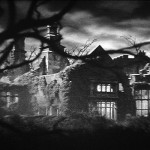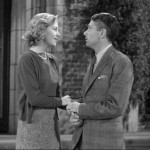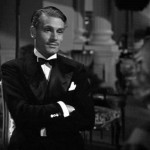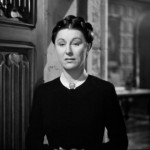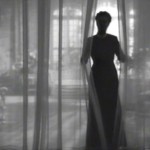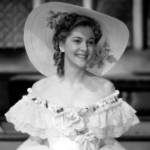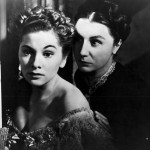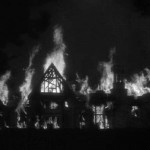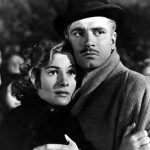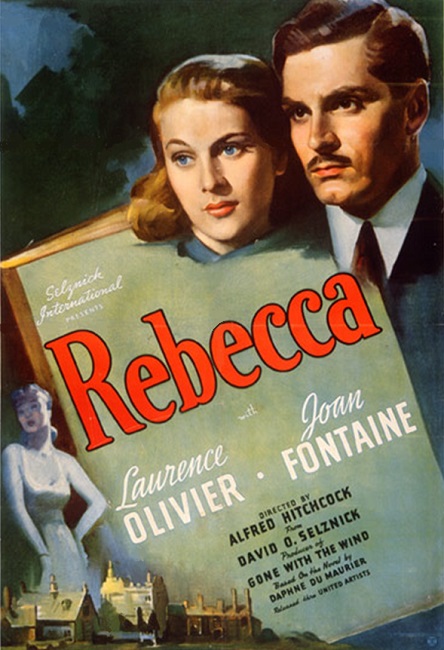
Rebecca – 1940
Alfred Hitchcock is best known for his psychological thrillers and mysteries. Rebecca is a perfect example. The byword of the day is creepy! This was a creepy movie, from the characters and the settings to the music and the plot. I would say that Hitchcock gave us what we were waiting for, except that this was one of his earlier films, so I should say he was letting us know what to expect in the future. While I enjoyed the film, there was one aspect which was never explained. But more of that later…
The opening shot is an intriguing one, where the camera is following a winding path on a dark and misty night. The spooky music is playing in the background and a woman’s melancholy voice is describing how she sometimes comes here to this place. Eventually, the road leads to the burnt-out shell of a house. I found myself wondering who was speaking, a live woman or a ghost. With Hitchcock, you never know.
The main character is, for some reason, never named. The credits list her as the Second Mrs. de Winter, never giving her a first name. She is played by Joan Fontaine, and is a woman who has so little self-confidence, or so much shyness (or maybe both) that she can never look anyone in the eye, not even when she is in a face-to-face conversation with them. Creepy! But despite this extreme fear of connecting with anyone, she is able to catch the eye of super-rich Maxim de Winter, played by Lawrence Olivier. He pursues her, and within the space of a few weeks, she falls madly in love with him.
Of course, he has a temper that rears its ugly head whenever she mentions the sea, or his past, or costume parties, or anything that reminds him of his first wife, Rebecca, who is dead. Never-mind the fact that his head housekeeper Mrs. Danvers, played by Judith Anderson, keeps all Rebecca’s things exactly as they were when she was alive. Apparently, Maxim doesn’t mind that, but he flies into a rage any time the Second Mrs. de Winter even begins to so much as look too much like Rebecca, or does anything to remind him of her.
Mrs. Danvers is the creepiest character of all. Hitchcock even turned up the volume on the spooky haunted house organ music when she is first introduced, as if he wanted the audience to have no doubt that this was the scary bad guy. But he needn’t have gone so far. Anderson’s wonderful portrayal was enough. Almost immediately, you could tell that she resented Maxim’s new bride. The only time she ever smiled was the scene in which she was showing off Rebecca’s old room to the Second Mrs. de Winter. She had, of course, kept the room exactly as it had been before Rebecca’s death. Creepy! But then when she began to fondle Rebecca’s old fur coat, and even took a moment to caress the other woman’s face with it, I finally began to understand. Even though the movie never explicitly stated it, the lesbian tendencies in Mrs. Danvers suddenly became all too evident.
Interesting note: Apparently, the original book that the movie was based on made Mrs. Danver’s obsession with Rebecca one of maternal love, not romantic or sexual love. We can thank Hitchcock for giving it that little twist.
Another thing that caught my attention about the film was that in nearly every scene or shot, there are shadows. Some shadows were on the walls, some on the floor, and some on the actors. I don’t know if this was a conscious decision on Hitchcock’s part or not, but it gave the entire film a subtle mysteriousness. It was like a subliminal manipulation, making the viewer imagine a variety of hidden things – hidden motives, subtle subtext, buried emotions, unseen dangers. Creepy!
In my research, I found that the movie remained pretty close to the book, due largely in part to producer David Selznick. The one major difference that he had to concede to was the ending. Apparently, in the book, Maxim actually did murder Rebecca by shooting her. But in the movie, he only thought of killing her, whereupon she fell, hit her head, and died. You see, that little detail had to be altered to comply with the Hollywood Production Code which stated that the murder of a spouse had to be punished. We can’t have him getting away with something like that!
One of the things that the movie never explained to my satisfaction was the reason behind the Second Mrs. de Winter’s crippling social anxieties. They gave very little of her back story. That being said, I really enjoyed Fontaine’s performance. She made the character’s transition from a painfully shy nobody to the mistress of a rich and powerful man’s estate very believable. She was overwhelmingly intimidated by her new position and status, and little by little, her character grew into someone who could own the role of being the millionaire’s wife.
All in all, it was a good movie, but then again, you can rarely go wrong with Hitchcock. He really knew what he was doing.
One last thing. Watch out for the character of Ben, played by Leonard Carey. Super-creepy!
